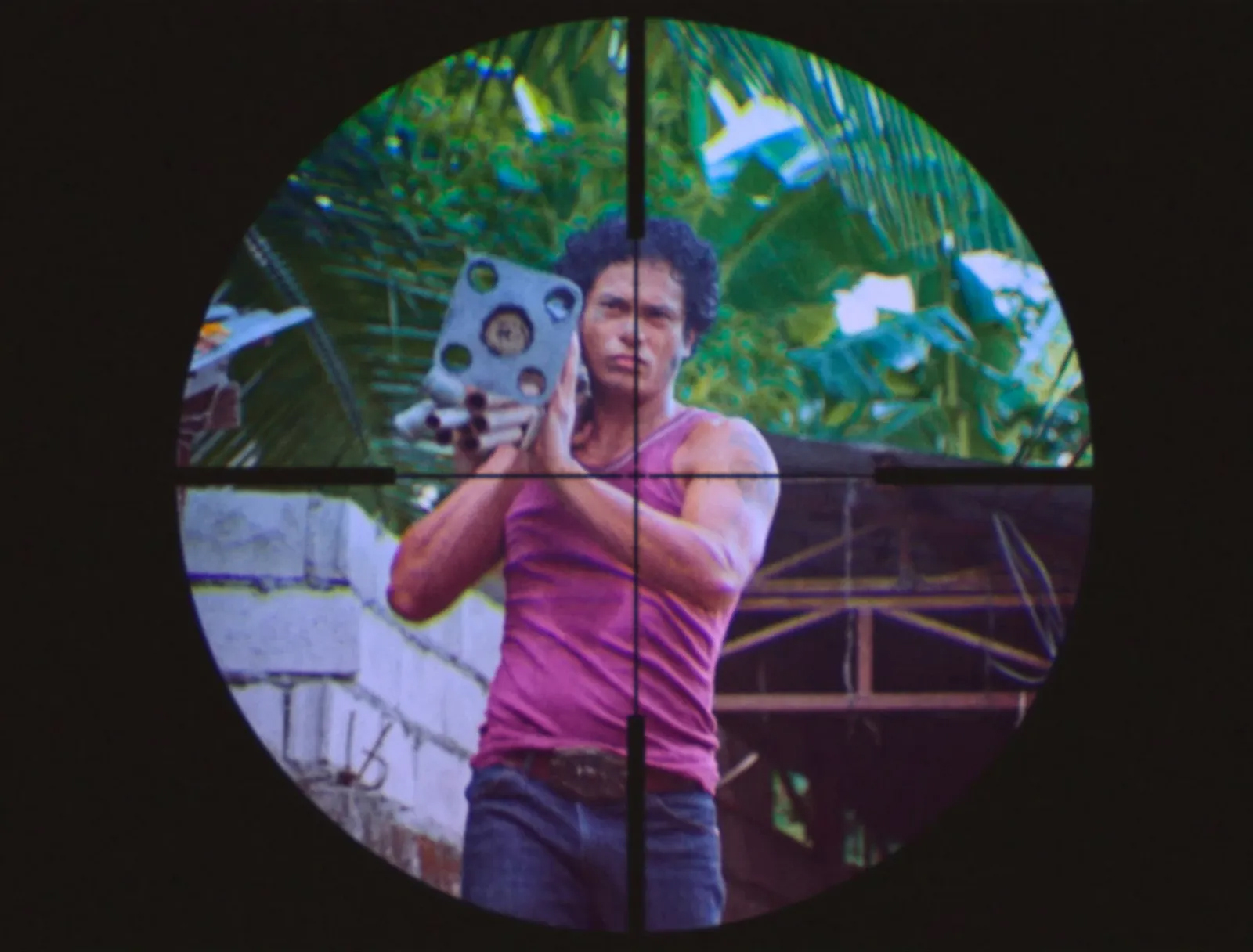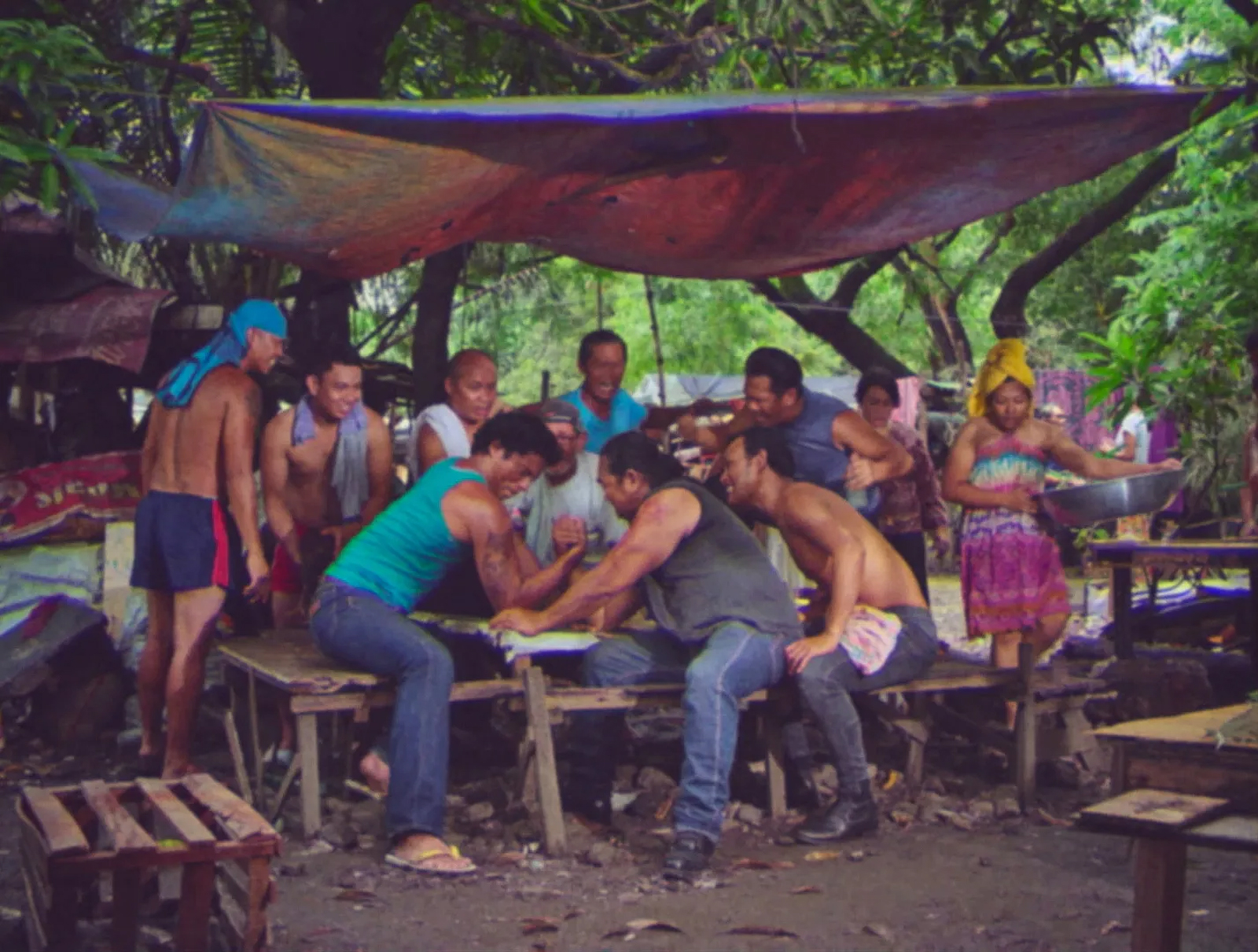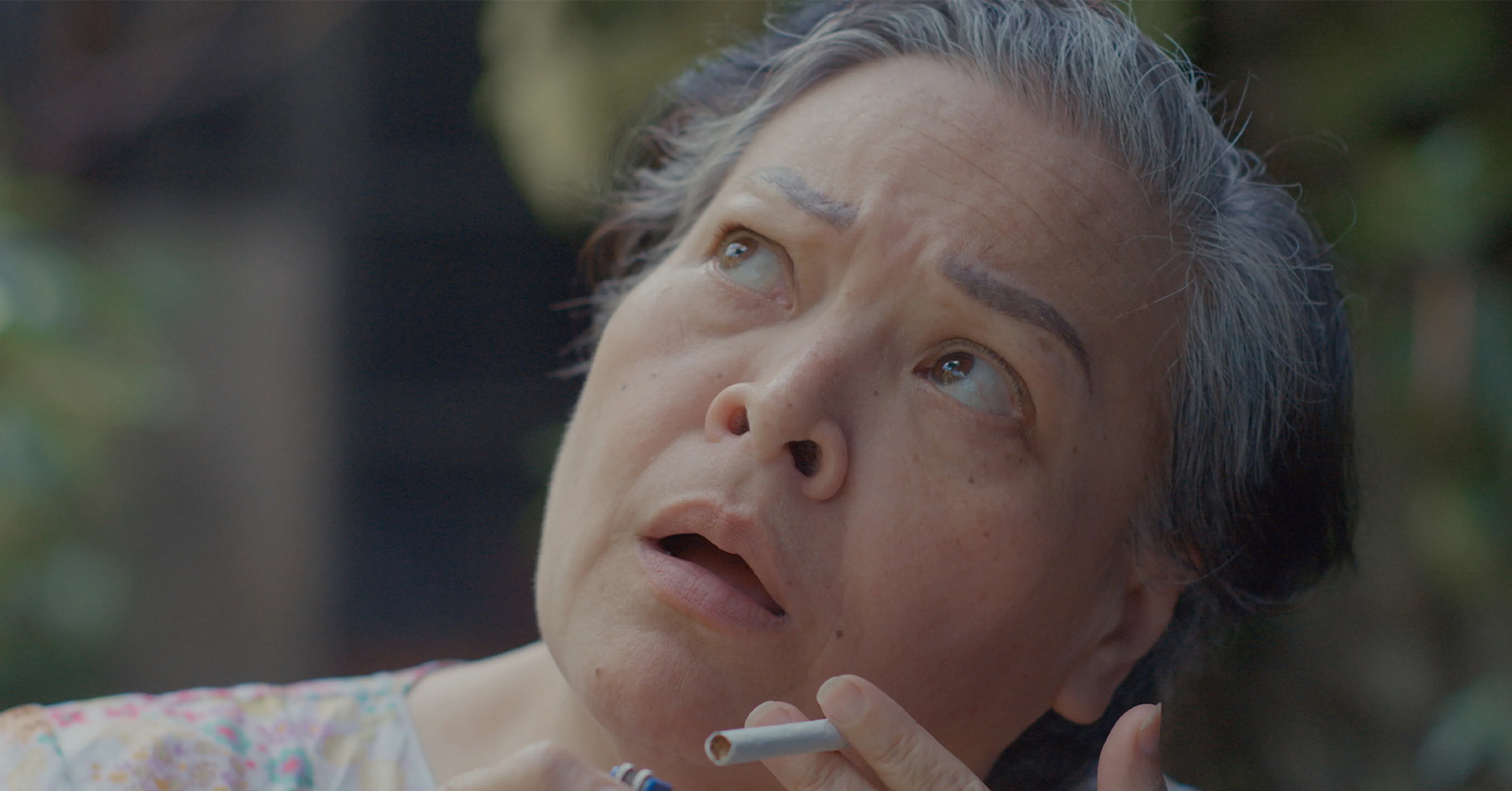Sheila Francisco as Leonor, a retired filmmaker who finds herself transported to the world of her own unfinished script in the film Leonor Will Never Die. Carlos Mauricio; courtesy of Music Box Films
Sheila Francisco as Leonor, a retired filmmaker who finds herself transported to the world of her own unfinished script in the film Leonor Will Never Die. Carlos Mauricio; courtesy of Music Box Films
You’ve never seen a grandma like the kick-ass senior at the center of the new Filipino film Leonor Will Never Die. She’s a veritable action star who knocks out baddies and saves lives in the same airy housedress worn by lolas the world over.
When Leonor, a retired filmmaker, is conked on the head by a falling TV, reality and fantasy blur as she finds herself transported to the world of her own unfinished script. A playful mash-up of pulpy action homage, zany self-aware comedy, and heartfelt family drama with flashes of meta and magical realism, Leonor Will Never Die is an utterly delightful ode to cinema—classic Filipino action films, in particular—that’s sure to put a smile on your face.
It’s charmed many of its audiences so far: Earlier this year it became only the second feature from the Philippines to show at Sundance, where it won a special jury prize for innovative spirit; later, at the Toronto International Film Festival in September, it garnered an Amplify Voices prize for underrepresented filmmakers, with the jury praising the film’s “original voice, made by a fearless filmmaker who knows how to bring the fun and an incredible lead performance. This film is truly one of one.” Just this week the film was nominated for a Film Independent Spirit Award for best international feature, where it’s up against highly touted films like Alice Diop’s Saint Omer and Marie Kreutzer’s Corsage.
Screenwriter and director Martika Ramirez Escobar came up with the idea eight years ago, at a workshop run by veterans of the action-film industry in the ’70s and ’80s. They still very much dressed the part, appearing in leather boots, big-buckle belts, sunglasses, and brushed-up hair. “I was fascinated by their obsession with that era and its movies,” she said recently via Zoom from the Philippines. “I wondered, What is it about action films that makes them feel like they’re still in a movie? But I realized that even I find myself imagining life as one big film.”
Perhaps that’s to be expected given that Escobar was practically raised on those same action films, began shooting home movies when she was seven, and later revered the works of noted reality-tinkerers Spike Jonze, Charlie Kaufman, and Michel Gondry. But there’s a deeper meaning to Leonor Will Never Die’s layered narrative. “It’s essentially about an existential crisis,” she says of her feature directorial debut, “and not knowing how to write our own lives and trying to write it through the people we meet along the way.”
Seasoned theater performer Sheila Francisco—best known for playing Bloody Mary in an early-2000s production of South Pacific on the West End—is the titular character, her very first lead film role. She was skeptical when she first heard about the project. “I didn’t want to do it because I just didn’t understand it,” she says with a wide, sparkling grin, joining Escobar on the video call. “[The filmmakers] were saying, ‘We plan to do an action movie, and you are going to be the action star.’”
The actor acknowledges that “Filipinos have a fascination for action films, especially old action films. But,” she chuckles, “I’ve never seen a female action hero, a mature female action hero. And for somebody like me, you play the mom, the best friend, the funny woman. I never thought that I would star in a movie at my age.”
Yet Francisco was won over by the then 21-year-old director’s impassioned pitch. “Here’s this very young girl who wants to do a movie with a much older woman playing an action star,” she says. “I was curious what she would do with it.”
Escobar has long been fascinated by grandmas. “My own sees so much beauty in life, which is the opposite of what I see. I often think that life sucks, but when I talk to her, she redeems that concept.” So the filmmaker eventually came to wonder: Why aren’t there grandmas starring in action films? She saw the chance to offer a new take on a genre known for its machismo. “We wanted to show how a person can face violence and solve problems through the tender eyes of a woman,” Escobar says.
Genre films tend to reflect wider anxieties, and when Philippine president Ferdinand Marcos declared martial law in 1972, films became a form of propaganda, enforced through a government film-censorship board for the next 14 years. It’s no coincidence that the country’s action films were at the height of their popularity in those years. “It was the time when Filipinos felt the most helpless,” Escobar explains. “To see heroes on screen gave them comfort.”
Decades later the country would see a number of swashbuckling-tough-guy movie stars ascend the political ranks, most notably former president Joseph Estrada (ousted in 2001), who played the lead in more than 100 action films, and Fernando Poe Jr., who appeared in 300 films as a champion and defender of the poor but narrowly lost his 2004 presidential bid. Many actors-turned-politicians even directly linked their film roles to their real-life personas. But most have lacked experience in law and governance, and once in office, “they mostly play their characters, so they don’t really deliver,” Francisco notes.

But no sociopolitical context is necessary to enjoy Leonor—it’s hard for a scene of goons finding themselves at the wrong end of a cement mixer to get lost in translation. “There is a cultural specificity to the cinema that the film explores, but every part of the world has those subgenres of movies that are popular and somewhat ubiquitous and that we grow up with,” says Peter Kuplowsky, who programs TIFF’s Midnight Madness section and selected the film to close this year’s edition. “So it felt very universal.”
Kuplowsky first saw the film at Sundance (“It was far and away my favorite thing I saw at the festival”) and found himself “totally charmed by it, how it broke the rules and how unconventional it was.” The rapturous TIFF midnight audience gave it a standing ovation. “It was a feel-good reminder of how enlightening it can be to experience a film together. And the film really speaks to that sense of community that can be established through a communal love for cinema.” He points out that genre films can often be a prime gateway to world cinema—just look at Thailand’s Ong Bak (2009), Indonesia’s The Raid (2011), or any number of classic Hong Kong action films.

“TIFF was our best screening ever,” Escobar confirms, adding that audiences in North America have tended to be more enthusiastic than those at home. “I’ve been to a lot of screenings in the Philippines where the theaters are almost empty,” she says. “People would rather buy something else than pay for a movie ticket, which makes sense in a third-world country.” But she’s hopeful that she can foster the film appreciation she sees abroad at home.
Francisco, meanwhile, has just been enjoying the wildly unexpected ride the film has been on. “It was a simple dream that has become so wonderfully received worldwide,” she says, beaming again. “I feel blessed at my age. I’m really quite happy to say that, ‘Okay, if this is it, then I can die now.’”
Escobar hopes the film prompts reflection from audiences about how they’re shaping the final cut of their own stories. “I think everybody can relate to imagining their ideal life,” she says. “I’m sure we all have our versions of our lives that we want to edit, reedit, revise, and perhaps make beautiful.”
Leonor Will Never Die opens Friday in New York and will be in select theaters nationwide in the following weeks.
This article was originally published on Vogue.com
- For Her Debut Film, Leonor Will Never Die, Director Martika Escobar Featured An “Action Lola”
- Internationally Acclaimed Films To Watch In Theaters Before The Month Ends
- At MoMA, A Legendary Filipino Filmmaker Rediscovered
- Mother Lily On 38 Years of Shake, Rattle, & Roll: “Film Mirrors People’s Lives”
